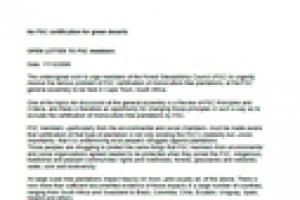Only available in Spanish -
Señor Manuel Zelaya Rosales, Presidente de la República Señor Roberto Micheletti, Presidente del Congreso de la República Abogada Vilma Morales, Presidenta de la Corte Suprema de Justicia Diputadas y Diputados del Congreso Nacional Magistradas y Magistrados de la Corte Suprema de Justicia
Honduras
Bulletin articles
29 July 2004
Some 3,000 people marched 200 kilometres to converge in Tegucigalpa with the aim of demanding that President Ricadro Maduro’s government protects the country’s natural resources. They came from four different Honduran cities and took from 22 to 30 June to reach the capital.
Bulletin articles
13 December 2003
On the night of 26 November 2003, journalist Germán Antonio Rivas was shot and killed. He was the managing director of Corporación Maya Visión television station, which broadcasts from the western city of Santa Rosa de Copán, on the border with Guatemala. He was the director of the news program “CMV-Noticias,” known for its criticism of the installation of a mining operation within the Guisayote National Park in the department of Ocotepeque, questioning the activities of the mining company due to the impact they would have on the environment and the conservation of natural resources.
Other information
19 August 2003
For most of the population of Honduras, the Rio Platano Biosphere Reserve is a motive for national pride. Added to the scenic beauty of this zone is its biological and cultural wealth with its conservation ensured for future generations. However, another part of the population – the most important one – is not of the same opinion.
Bulletin articles
31 July 2003
Around the year 2002, the forests in the department of Olancho were being devastated by the action of logging companies. Forest destruction was done to feed many saw-mills (both legal and illegal), and in some of them, several parliamentarians were directly involved. While the companies got richer, the local populations received the impact of timber exploitation, in particular the disappearance of water resulting from felling the forest and the ceasing of its function regulating the water cycle.
Bulletin articles
31 July 2003
The Second Meso-American Forum against Dams "For the Peoples' Water and Life" was held from 17 to 20 July in Honduras. One hundred and fifty delegates participated, "concerned over the increasing invasion by dam-building projects imposed by large transnational companies and multilateral bodies, in partnership with the corrupt governments of the Meso-American region."
Other information
30 June 2003
The sun sets on the Siria Valley; the temperature is over 38 degrees centigrade. It was always hot here, it is a valley, but never before had the heat reached the levels it does nowadays. The rivers and streams are only a memory, now they look like tracks, deserted and dusty because of deforestation and the extraction of thousands of metres of sand.
Bulletin articles
2 January 2003
On 23 November, 2002, at the Eighth Conference of the Parties to the Ramsar Convention for the conservation of wetlands, held in Valencia, Spain, the Honduran environmental organisation, Committee for the Defence and Development of Flora and Fauna in the Gulf of Fonseca (Comité para la Defensa y Desarrollo de la Flora y Fauna del Golfo de Fonseca - CODDEFFAGOLF), denounced serious irregularities that involve its country's official representation, discredit the Ramsar Convention and undermine attempts to conserve mangrove forests, lagoons and other coastal wetlands.
Bulletin articles
3 December 2002
Bertha Oliva's life was indelibly marked by the kidnap and disappearance of her husband Tomás Nativí, in June 1981, by government security forces. In 1982 she founded the Committee of Families of the Detained-Disappeared in Honduras (COFADEH), an organization she still heads today.
But two years ago she took on a new cause: defending the environment. The decision came after two ecologists were assassinated in the northeastern department of Olancho. A fierce battle against deforestation is under way there. An average of 80,000 hectares of Honduran forest disappears each year.
Bulletin articles
7 November 2002
At daybreak on 7 November, under the leadership of the NGO, CODDEFFAGOLF and of REDMANGLAR (the Mangrove Network), over 2,000 fisherfolk and peasants abandoned their humble dwellings in the coastal wetlands of the Gulf of Fonseca, internationally known as "Ramsar Site 1000," to launch a mobilisation in protest over the destruction of the mangrove forests, lagoons, marshes and other wetlands that host a wide biodiversity, and are their source of food and income.
Bulletin articles
27 October 2001
The waters of the Pacific Ocean penetrate the territory of Honduras, Nicaragua and El Salvador through a 35 km entry, forming a water mass of 3,200 kms2 known as the Gulf of Fonseca, with a 261 km coastline.
Different types of wetlands are to be found along the coast, such as mangroves, periodically irrigated by the tides. A forest inventory made in 1987, showed that in the Honduran sector of the Gulf, there were 47,000 hectares of mangroves that year.
Bulletin articles
11 September 2001
Thirty delegates from 10 Latin American countries met at Choluteca, Honduras, from 27 to 30 August to establish the REDMANGLAR (Mangrove Network). Its main objective is to defend mangroves and coastal ecosystems, to guarantee their vitality and that of the populations who relate with them, from hazards and impacts of activities, mainly industrial, likely to degrade the environment.
The REDMANGLAR has the following objectives:
1.- To halt the expansion of inappropriate economic industrial activities in coastal ecosystems as they are considered to be destructive.

